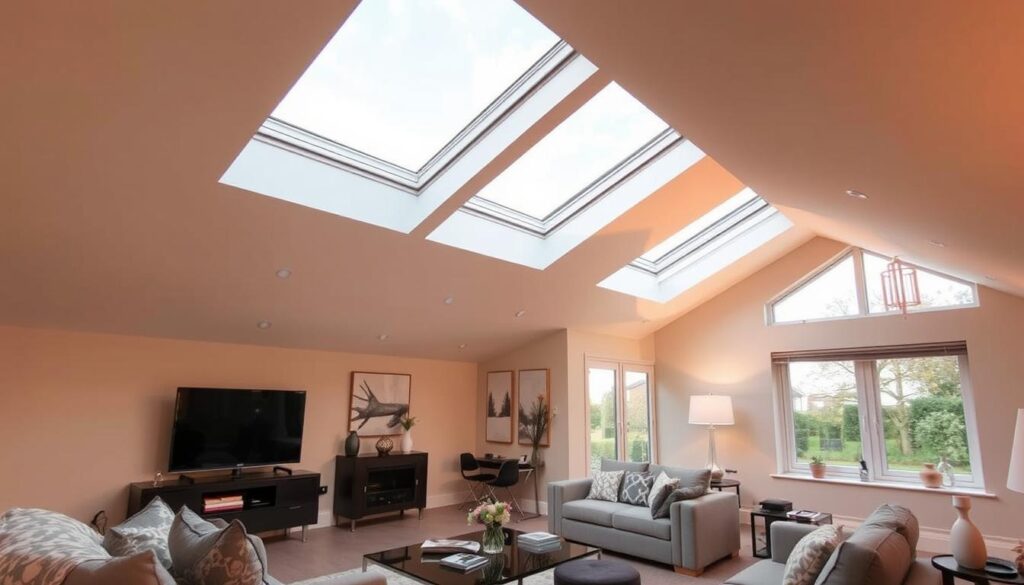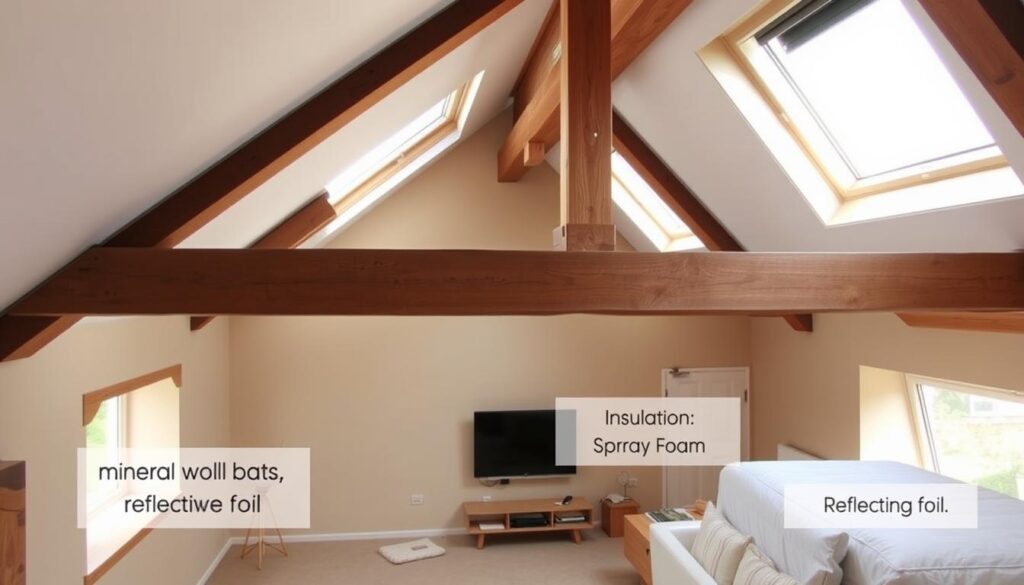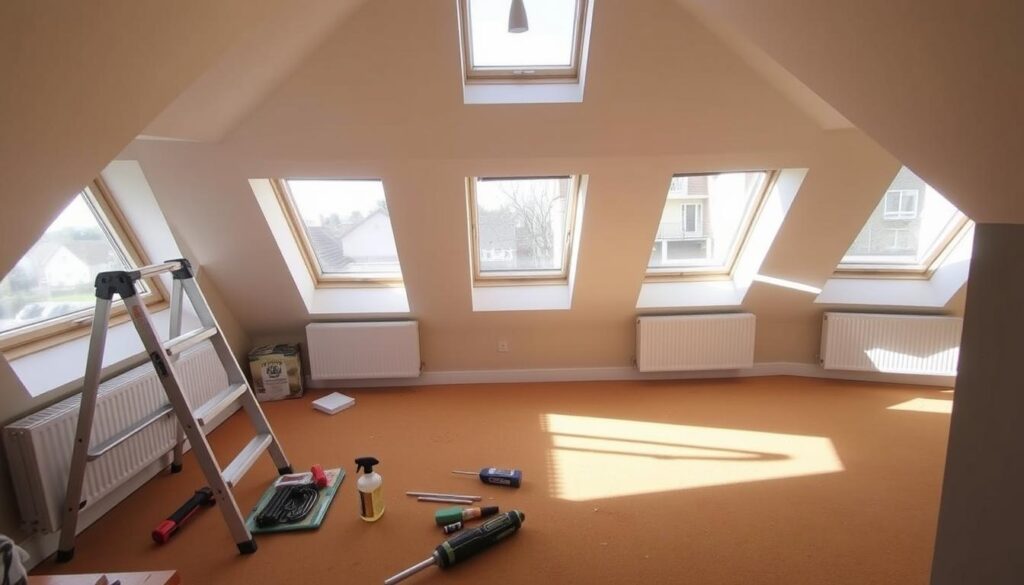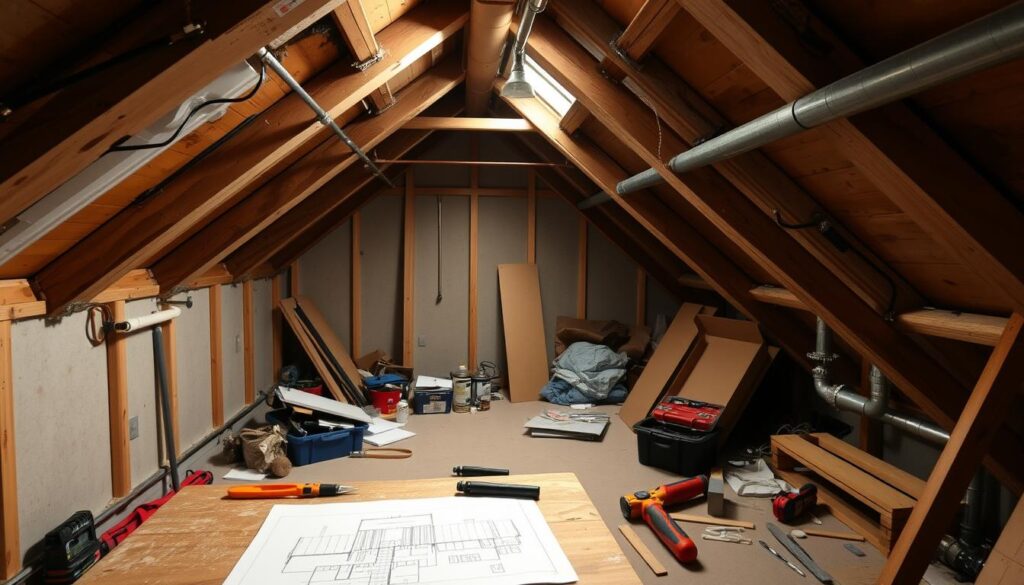Velux Loft Conversion
Transform Your Home
Velux loft conversions are now a top choice in the UK. They turn unused attic spaces into useful living areas. This method uses skylight windows to bring in more natural light and air, making rooms bright and airy. It also increases the value of homes.

Choosing a Velux loft conversion lets UK homeowners make the most of their space. It’s a smart way to improve living areas without the need to move or build extensions. This approach is both effective and cost-friendly.
Key Takeaways
- Velux loft conversions transform unused attics into functional living spaces
- Skylight windows enhance natural light and improve ventilation
- Space utilisation is optimised without expanding the property’s footprint
- Attic conversions add significant value to UK homes
- Velux solutions offer a cost-effective alternative to moving or extending
Understanding Velux Loft Conversion Basics
Velux loft conversions are a hit with homeowners wanting more space. They use roof windows to make attic areas bright and airy. Let’s dive into the basics of this smart loft renovation.
What Is a Velux Loft Conversion
A Velux loft conversion adds roof windows to turn your attic into a usable room. It’s a budget-friendly option that needs little structural work. The goal is to bring in lots of natural light and fresh air through the windows.
Key Benefits of Choosing Velux Windows
Velux windows bring many perks to your loft conversion:
- More natural light for a roomy feel
- Better air flow for cleaner air
- Energy-saving glazing tech
- Flexible daylight solutions for all roof types
Common Types of Velux Installations
Velux has various window styles for different loft areas:
| Window Type | Best For | Features |
|---|---|---|
| Top-Hung | Unobstructed views | Opens outwards from the bottom |
| Centre-Pivot | Low ceiling heights | Rotates 180 degrees for easy cleaning |
| Balcony | Extra space and light | Opens to create a small balcony area |
Knowing these basics helps you choose the right Velux loft conversion. It ensures your attic space is transformed successfully.
Planning Permission and Building Regulations
Understanding UK building codes for Velux loft conversions can be complex. Many projects don’t need formal planning permission. This is true if the conversion doesn’t change the roof shape or go over certain height limits.
For bigger changes, you’ll need local authority approval. This means sending in detailed plans and waiting for a decision. It’s important to talk to your council before starting work.
All loft conversions must follow building regulations, even without planning permission. These rules cover things like structural changes, fire safety, insulation, and ventilation. A building control officer will check your project at different times to make sure it meets these standards.
“Always consult professionals when planning your Velux loft conversion. They can guide you through the complexities of UK building regulations and help secure necessary approvals.”
Here’s a quick overview of key considerations:
- Structural stability of existing floors and walls
- Fire safety measures, including escape routes
- Staircase design and placement
- Adequate headroom and floor strength
- Proper insulation and ventilation
| Aspect | Permitted Development | Full Planning Permission |
|---|---|---|
| Roof alteration | No change to existing shape | Significant changes allowed |
| Volume addition | Up to 40 cubic metres for terraced houses | Can exceed 40 cubic metres |
| Window placement | Side-facing windows must be obscure-glazed | More flexibility in window design |
| Timeframe | Quicker process | Longer approval process |
Cost Analysis and Budget Planning
Planning a Velux loft conversion needs careful thought about prices and regional differences. Knowing these is key for a good budget.
Average Conversion Costs in Different UK Regions
Loft conversion prices change a lot across the UK. In London and the South East, costs are higher because of labour and material prices. But, the North often has better deals.
| Region | Average Cost Range |
|---|---|
| London | £40,000 – £60,000 |
| South East | £35,000 – £55,000 |
| Midlands | £30,000 – £45,000 |
| North | £25,000 – £40,000 |
Material Cost Breakdown
Most of your budget will go to materials. Velux windows, insulation, and structural stuff are the main costs. Good materials last longer but cost more upfront.
Labour Expenses and Timeframes
Labour costs usually make up 40-50% of the total. Most Velux conversions take 4-6 weeks. Longer projects cost more in labour. Skilled workers are vital for quality, affecting your costs.
While budgeting is crucial, spending on quality materials and skilled labour can pay off in the long run.
Design Considerations for Your Velux Conversion
Planning your Velux loft conversion needs careful thought. You want a space that’s both useful and looks great. Let’s look at key aspects of loft design and space use to get the best from your new room.
Window Placement Strategies
Getting your windows right is key for light and looks. Place Velux windows on both sides for a balanced, bright space. Adding standard and full-length windows can make views even more special.
Natural Light Optimisation
Position windows to catch sunlight all day. South-facing ones get the most light, while north-facing ones offer softer light. Remember to add blinds or shades for privacy and light control.
Interior Layout Planning
Good layout planning is vital for making the most of your space. Here are some tips:
- Create zones for different activities (sleeping, working, relaxing)
- Use built-in storage to save floor space
- Choose furniture that does more than one thing
- Make the most of sloping ceilings for a unique look
By focusing on these design points, you’ll create a loft that’s both beautiful and practical. Remember, good planning and design are key to turning your attic into a stunning living area.
Technical Specifications and Requirements
When planning a Velux loft conversion, knowing the technical details is key. Velux windows come in sizes from 55x78cm to 134x140cm. This range suits different room sizes and light needs. It’s important to pick the right size for your space, keeping the roof pitch in mind.
The roof pitch is crucial for a Velux installation. Most Velux windows work for pitches between 15° and 90°. For steeper pitches, special flashing kits are needed to stop leaks.
Structural support is also vital. Your roof must handle the extra weight of the windows. Sometimes, you might need to strengthen rafters or add new beams to keep your roof safe.
- Assess roof structure before installation
- Consider load-bearing capacity of existing beams
- Consult a structural engineer if unsure
Ventilation is also key in loft conversions. Velux windows help with airflow, but more might be needed. UK building rules say you need at least 1/20th of the room’s floor area for ventilation.
| Room Type | Minimum Ventilation Requirement |
|---|---|
| Bedroom | 2500mm² per m² floor area |
| Living Room | 4000mm² per m² floor area |
| Bathroom | 15 litres per second |
By looking at these technical details, you can make sure your Velux loft conversion is a success. It will let in plenty of natural light and air while keeping your roof strong.
Energy Efficiency and Insulation Solutions
Velux loft conversions are great for making your home more energy-efficient. They help you save energy and make your living space more comfortable. Plus, they reduce your carbon footprint.
Thermal Performance Ratings
When choosing Velux windows, check their thermal performance ratings. These ratings show how well the windows keep heat in. This is key for saving energy.
| Rating | U-value (W/m²K) | Energy Efficiency |
|---|---|---|
| A++ | 0.8 or less | Excellent |
| A+ | 0.9 – 1.2 | Very Good |
| A | 1.3 – 1.6 | Good |
Insulation Materials and Methods
Good insulation is key for a comfy loft conversion. Use materials like sheep’s wool, cellulose, or spray foam. They keep your space warm and are good for the planet.

Energy Saving Benefits
Choosing energy-efficient options for your Velux loft can save you money over time. It cuts down on energy use and lowers your bills. This is good for your wallet and the environment.
- Reduced heating and cooling costs
- Improved indoor comfort
- Lower carbon emissions
- Increased property value
Installation Process and Timeline
A Velux loft conversion needs careful planning and execution. The steps usually take several weeks. The exact time depends on the project’s complexity. Professional installation makes the process smooth and follows the timeline.
Managing the project is key. It involves coordinating different parts of the conversion. Here’s a typical timeline for a Velux loft conversion:
| Week | Task |
|---|---|
| 1-2 | Site preparation and scaffolding |
| 3-4 | Structural alterations and roof work |
| 5-6 | Velux window installation |
| 7-8 | Insulation and plasterboard fitting |
| 9-10 | Electrical and plumbing work |
| 11-12 | Flooring, painting, and final touches |
The process starts with a detailed check of your loft. Experts then make structural changes to support the new windows. After preparing the openings, the Velux windows are installed.
Next, insulation is added to improve energy efficiency. The area is then plastered and decorated as you wish. Regular checks are done to meet building rules and keep quality high.
“A well-managed Velux loft conversion can transform your home in just 12 weeks, adding valuable living space and natural light.”
Knowing the installation steps and timeline helps homeowners prepare for their Velux loft conversion. It ensures a smooth and successful change to their living space.
Maximising Space Usage in Your Conversion
Turning your loft into a useful living area needs smart space-saving ideas. A well-thought-out Velux conversion can make the most of every inch. This creates a space that is both versatile and comfy.
Storage Solutions
Storage is key in small living spaces. Built-in wardrobes, under-eaves cupboards, and knee-wall drawers make the most of odd corners. Think about pull-out storage or floating shelves to keep the floor clear.
Furniture Arrangement Tips
Pick furniture that does more than one thing. A sofa bed offers both sitting and sleeping areas. Folding tables can be hidden away when not needed. Place big items against walls to keep the area open and easy to move around.
Multi-functional Space Ideas
Make your loft conversion flexible for different uses. A home office can also be a guest room with a Murphy bed. Use a rolling partition to divide the space into different areas. A reading nook can turn into extra storage when you need it.
- Use vertical space with tall bookshelves or hanging organisers
- Invest in ottoman beds or storage benches for hidden storage
- Install pocket doors to save space and improve accessibility
By using these space-saving tips, your Velux loft conversion can become a stylish and practical part of your home. It’s perfect for those who live in compact spaces.
Maintaining Your Velux Windows
Keeping your Velux windows in good shape is vital. It helps them last longer and work better. Regular care makes sure they keep your loft bright for years.

Cleaning Velux windows is easy. Use a soft, damp cloth on frames and glass. Avoid harsh materials that might scratch. For tough spots, a mild soap solution is great. Don’t forget to clean the gutters to stop water from building up.
To make your windows last longer, oil hinges and locks with silicone spray once a year. Check the weatherstripping for wear and replace it if needed. This keeps your windows energy-efficient. Also, look at the flashing around the window for gaps or damage and seal them to stop leaks.
- Clean windows every 3-4 months
- Lubricate moving parts yearly
- Check seals and flashing annually
- Clear debris from gutters regularly
For the best performance, get professional help every few years. They can spot problems early, keeping your Velux windows working well. This also helps them save energy.
“Regular maintenance is key to preserving the beauty and functionality of Velux windows, contributing significantly to the overall comfort of your loft space.”
By sticking to these easy maintenance steps, your Velux windows will stay in great shape. This means they’ll keep your loft bright and welcoming for many years.
Property Value Impact and ROI
Velux loft conversions can greatly increase your home’s value and appeal to investors. They fit well with today’s real estate trends. This means homeowners can see good returns on their investment.
Market Value Increase Statistics
Research shows that loft conversions can significantly raise property values. In the UK, a well-done Velux loft conversion can add up to 20% to your home’s value. This is a big financial win, especially in areas where homes are in high demand.
| Region | Average Value Increase | Typical ROI |
|---|---|---|
| London | 15-25% | 70-80% |
| South East | 12-20% | 65-75% |
| Midlands | 10-18% | 60-70% |
| North | 8-15% | 55-65% |
Long-term Investment Benefits
Velux loft conversions offer more than just immediate benefits. They provide long-term advantages for investors. The extra space can mean more rental income for landlords. Homeowners also see lower utility bills thanks to the improved energy efficiency.
Real estate trends show that homes with loft conversions sell quicker and for more money. This makes Velux conversions a wise choice for boosting your property’s appeal and value in the UK’s competitive housing market.
Choosing the Right Contractors
Finding the right contractors for your Velux loft conversion is key to success. The right team means quality work and peace of mind.
Qualification Requirements
When choosing contractors, focus on certified installers. They have the training and skills for Velux installations. Look for those with the right qualifications and trade association memberships.
Vetting Process
A detailed vetting process is vital for quality. Ask for references and check their past work. Look at online reviews and ratings too. Make sure they have experience with Velux loft conversions.
Insurance and Warranties
Make sure your contractor offers solid project guarantees. This includes warranties on work and materials. Also, check they have the right insurance, like public liability and professional indemnity.
| Contractor Checklist | Importance |
|---|---|
| Velux Certification | High |
| Trade Association Membership | Medium |
| Client References | High |
| Insurance Coverage | Critical |
| Workmanship Warranty | High |
By following these steps, you’ll find a contractor for a top-notch Velux loft conversion. It will boost your home’s value and function.
Common Challenges and Solutions
Starting a Velux loft conversion can face many obstacles. Knowing these challenges and how to solve them is key to success. Here, we’ll look at common problems and expert tips to beat them.

One big issue is limited headroom. To fix this, you might need to lower the ceiling or raise the roof. Both steps need careful planning and might affect your budget.
Structural problems can also be a big hurdle. You might need to strengthen floor joists or add steel beams. Getting advice from a structural engineer is vital for safe and legal solutions.
Planning issues can slow down your project. It’s important to research local rules well and talk to planning authorities early. This can help you avoid delays and get the approvals you need.
| Challenge | Solution |
|---|---|
| Limited headroom | Lower ceiling below or raise roof ridge |
| Structural constraints | Strengthen joists or add steel beams |
| Planning complications | Early engagement with authorities |
| Inadequate insulation | Install high-performance insulation materials |
Experts say it’s best to tackle potential problems early. This can save you time, money, and stress. Remember, every loft is different, so you might need a custom solution for the best outcome.
Smart Home Integration Options
Velux loft conversions open up new ways to automate your home. They let you enjoy more comfort, save energy, and make daily tasks easier.
Automated Window Controls
Smart skylights change the game in home tech. With Velux windows, you can control light and air with just a tap or voice command. They adjust to weather, time, or your mood.
Climate Control Systems
Linking your Velux windows with smart climate systems saves energy. They sense temperature and humidity, adjusting windows for the best indoor air. This keeps your home comfy all year and cuts down on bills.
Smart Lighting Solutions
Blend natural and artificial light for the best mood. Smart lights work with your Velux skylights, changing brightness with daylight. This mix saves energy and makes your home feel welcoming.
- Automated shading for privacy and temperature control
- Integration with popular smart home platforms
- Remote access and control via smartphone apps
- Energy usage monitoring and optimisation
Embracing these smart home features turns your Velux loft into a modern marvel. It’s a space that looks great and works better, setting new standards in living.
Alternative Window Styles and Combinations
Velux windows are popular for loft conversions, but there are other exciting options. These alternatives can make your space unique and functional.
Skylights are a classic choice for natural light. They sit flush with your roof, giving a sleek look. They’re great for areas needing light but no ventilation.
Dormer windows increase headroom and floor space. They protrude from the roof, adding volume. You can choose from flat-roof to gabled styles to match your home.
Roof lanterns are a luxurious choice for a grand statement. They sit atop a flat roof, bringing lots of light. They’re ideal for making a statement in larger loft areas.
- Skylights: Sleek, fixed windows for maximum light
- Dormer windows: Increase space and add character
- Roof lanterns: Create a stunning focal point
Combining these styles can create stunning results. For example, pairing Velux windows with a roof lantern adds a dynamic light effect. It’s important to balance light needs with practical considerations like thermal efficiency and privacy.
“The right window combination can transform your loft from a dark, cramped space into a bright, airy retreat.”
When exploring these options, talk to a professional. They can ensure your windows meet building regulations and fit your home’s structure. With careful planning, you can make your loft both beautiful and functional.
Conclusion
Velux loft conversions are a great chance for UK homeowners to improve their homes. They turn unused attic space into useful living areas. This boosts your lifestyle and adds value to your property.
The versatility of Velux windows lets you design creatively. You can make the most of natural light and space.
In this guide, we’ve looked at planning, costs, and design for Velux loft conversions. We’ve covered everything from building regulations to energy-efficient options. Each step is important for a successful project.
Smart home integration and different window options add to the customisation possibilities. This makes your loft conversion unique.
A well-done Velux loft conversion is more than just a home upgrade. It’s an investment in your property’s future. With good planning and professional help, you can create a beautiful new space.
This space will meet your needs now and make your home more appealing to buyers later. Take the chance to transform your loft. Enjoy better living spaces and a higher property value.
FAQ
What is a Velux loft conversion?
A Velux loft conversion turns an attic into a living space. It uses Velux roof windows to bring in natural light. This makes your home brighter, more ventilated, and more valuable without changing the roof.
Do I need planning permission for a Velux loft conversion?
Often, you don’t need planning permission for a Velux loft conversion in the UK. This depends on your property and location. Always check with your local authority or a professional to be sure.
How much does a Velux loft conversion typically cost in the UK?
The cost of a Velux loft conversion varies. It depends on your property’s size, location, and the work needed. Prices usually range from £15,000 to £45,000. For a precise quote, talk to local contractors.
What are the main benefits of choosing Velux windows for a loft conversion?
Velux windows bring natural light, better ventilation, and energy savings. They also look modern and are easy to install and maintain. This makes them a top choice for UK loft conversions.
How long does a typical Velux loft conversion take to complete?
A Velux loft conversion usually takes 4 to 8 weeks. The time can change based on the project’s complexity, the loft’s size, and any unexpected issues.
Can Velux windows be installed in any type of roof?
Velux windows work on most roof types, including pitched and flat roofs. The installation method and window type depend on the roof’s structure. Always consult a professional for the best fit.
How do Velux loft conversions impact property value?
Velux loft conversions can increase your property’s value by 10-20%. This boost comes from the extra space, better energy efficiency, and improved looks.
What are the energy efficiency ratings of Velux windows?
Velux windows are very energy efficient. They have different glazing options and are rated by the British Fenestration Rating Council (BFRC). Most Velux windows get an A or B rating, showing they save a lot of energy.
Are there any alternatives to Velux windows for loft conversions?
Yes, you can choose from dormer windows, roof lanterns, and traditional skylights for loft conversions. Each has its own benefits and considerations. The right choice depends on your needs and property.
How can I maintain my Velux windows to ensure their longevity?
To keep your Velux windows in good shape, clean them regularly with a soft cloth. Lubricate hinges and handles yearly and check seals for wear. Make sure drainage channels are clear. Professional inspections every few years are also a good idea.
